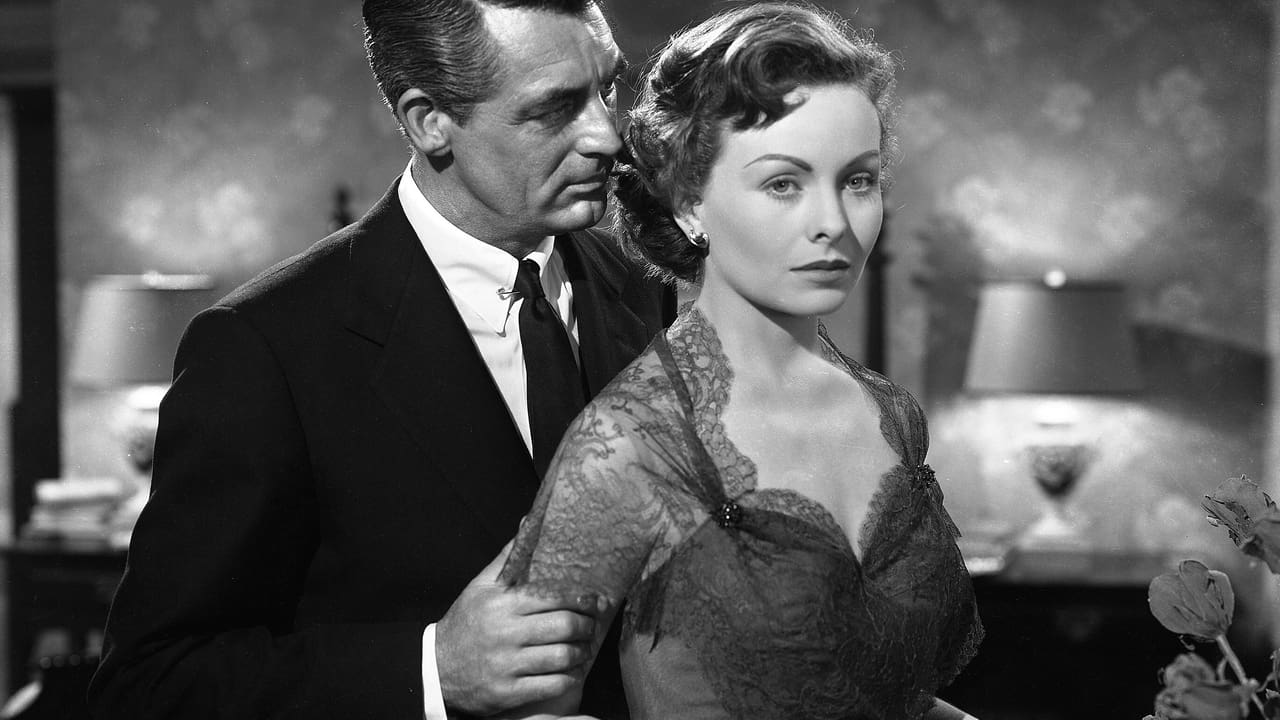atlasmb
The screenplay for "People Will Talk" is by Joseph Mankiewicz, who adapted the film from a play and also directed. It has been suggested that the story is an allusion to the workings of McCarthyism, which was active at the time.From the beginning of the film, there is a level of suspense as this unusual tale reveals itself slowly. Cary Grant plays Dr. Noah Praetorius, a physician and sometime butcher, with the quirky charm that only he can portray. His character has an ebullience and an unconventional approach to medicine that make him seem unprofessional to others in his profession. He has a mysterious friend called Shunderson (Finlay Currie) who is always by his side.Praetorius meets a young woman named Deborah Higgins (Jeanne Crain) who becomes his patient. He becomes involved in her problems as the film drifts through drama, comedy and romance.The supporting cast includes some enjoyable appearances. And the film's unpredictability makes for an interesting journey. The Praetorius character might be considered a precursor to Patch Adams. And in one scene he foretells a future that presciently includes "electronic doctors." This film deserves attention for its statements about individualism and nonconformity and for its unorthodox plot construction, which nevertheless works.
utgard14
Cary Grant plays a gynecologist named Dr. Praetorius (no relation to the famous character from Bride of Frankenstein, I presume) who finds himself the subject of a witch hunt at the hands of a jealous colleague (Hume Cronyn). One of Cary Grant's lesser known and under-appreciated films. It's an intelligent, thought-provoking drama from writer & director Joseph Mankiewicz, with some comedy sprinkled throughout. Obviously one wouldn't have to stretch to see some political overtones to it, given the time in which it was made. Fine work by a strong cast. In addition to Grant, who's terrific, there's the great Finlay Currie, Walter Slezak, Jeanne Crain, Sidney Blackmer, and Margaret Hamilton. Hume Cronyn makes a particularly slimy villain. One of the few flaws with the film is that Grant's character is a little too perfect. I mean there's saintly and then there's this guy. Still, it's a very good film that gives you a lot to chew on. I'm not sure why it isn't more well-known, except that a lot of the classic movie stars fit certain molds and, even today, I think fans prefer to see them in those types of films.
SimonJack
I agree with those reviewers who thought it was a wonder this film was ever made. And, I can see why its release wasn't highly acclaimed or received by audiences. Others describe the plot in detail, but for those who may not want to know the story line in advance, I'll just address these first two points to whet your appetite. First, why was it not highly popular on its release? Most likely because Cary Grant was out of character. Oh, sure, he had done some serious films – dramas and mysteries, but the public had gotten used to the witty Cary Grant of fast-paced comedy romances of the 1930s and 1940s. But, in "People Will Talk," they saw a considerably different Grant – one with wit and charm but also with serious compassion in a slower, deliberate role with a nice dose of mystery about him. And that leads to the second point – a wonder that this film was made at all. "People Will Talk" is a satire and critique of medicine, doctors and nurses, and medical schools and teachers. It also takes some jabs at the Western justice system – the courts and law enforcement. And, it has strong moral overtones. It looks at envy, jealousy and hypocrisy. The subtle theme that moves throughout the story is characterized by Dr. Noah Praetorius, played by Cary Grant. That is the importance of life and people for themselves, not for what they may or may not accomplish. So, this is indeed a mixed bag of a film – morality play, satire, witty comedy, drama, and an intriguing bit of mystery. It clearly is "sophisticated and sparkling," as billed by 20th Century Fox. A sub-theme in the film is the lead role's holistic approach to medicine. That was way ahead of its time. While holistic medicine became controversial in later years, medicine began to move in that direction a decade into the 21st century. All the cast give top performances in this film. The direction is excellent, and the film shines in all technical production areas. Following are some of my favorite witty exchanges and other lines from "People Will Talk."Prof. Elwell, played by Hume Cronyn, to Dr. Praetorius (Grant): "Do you deny that at that time your patients were under the impression you were a butcher and not a doctor?" Praetorius: "Do you prefer the impression given to their patients by so many of our colleagues that they are doctors and not butchers?"Prof. Elwell, to Miss Pickett, played by Margaret Hamilton: "I have conducted my affairs behind closed doors for 20 years." Miss Pickett: "Not with me." Prof. Elwell: "You overestimate both of us."Prof. Barker, played by Walter Slezak: "Dr. Praetorius, has it ever occurred to you, aside from certain medical considerations, that most of this is none of your business?" Praetorius: "No? What is my business?" Barker: "To diagnose the physical ailments of human beings and to cure them." Praetorius: "Wrong! My business is to make sick people well. There's a vast difference between curing an ailment and making a sick person well." Praetorius, eating at his kitchen table with Barker: "Sauerkraut belongs in a barrel, not in a can. Our American mania for sterile packages has removed the flavor from most of our foods. Butter is no longer sold out of wooden tubs. And a whole generation thinks butter tastes like paper. There was never a perfume like an old-time grocery story. Now they smell like drugstores, which don't even smell like drugstores anymore."Praetorius, at a faculty hearing: "And as to the willingness of those so-called ignorant and backward people to rely upon the curative powers of faith and possibly miracles too, I consider faith properly engendered into a patient as effective in maintaining life as alternatives. And a belief in miracles has been the difference between living and dying as often as any surgeon's scalpel." Prof. Elwell: "That is not the issue under discussion." Praetorius: "It is precisely the issue. Whether the practice of medicine should become more and more intimately involved with the human beings it treats, or whether it's to go on in this present way of becoming more and more a thing of pills, serums and knives, until eventually we shall undoubtedly evolve an electronic doctor."Mr. Shunderson, played by Finlay Currie: "Prof. Elwell, you're a little man. It's not that you're short. You're little in the mind and in the heart. Tonight you tried to make a man little whose boots you couldn't touch if you stood on tiptoe on top of the highest mountain in the world. And as it turned out, you're even littler than you were before."
pontifikator
This 1951 film directed by Joseph L. Mankiewicz has more promise than it fulfilled. The problem is the character of Noah Praetorius, too good to believable. The movie stars Cary Grant as the noble Noah, Jeanne Crain as his love interest, and it has able performances by Finlay Currie, Walter Slezak, and Hume Cronyn.The gist of the plot is that Professor Elwell (Cronyn) is investigating fellow teacher Dr. Praetorius for reasons that I am unclear about. Elwll is really digging up dirt, however. Noah ignores Elwell for as long as he can, concentrating on his personal clinic where he preaches and practices treating patients as human beings, not as their maladies. Noah also conducts the student symphony orchestra, and all his female patients fall in love with him, including Deborah Higgins (Crain).Boy meets girl, boy marries girl, they have a spat, boy has a hearing to determine his fitness as a doctor, boy wins trial, boy conducts symphony orchestra.There are several problems with the movie. Elwell is never given a motive for his investigation of Noah; we have no clue if it's professional jealousy or whether there's some reasonable basis for looking into Noah's fitness to continue as an instructor at the college where both teach. Second, Noah is just too good to be true. He's so good the character lacks credibility. I laughed out loud at several scenes not because they were funny but because the situations were laughably ridiculous. Hagiography comes to mind.The movie had promise that it failed. The movie was released in 1951 at the beginning of the McCarthy era, so my wild guess is that the investigation of Noah Praetorius is somewhat related to the witch hunt for commie spies. It may also be that Mankiewicz is skewering doctors - Noah gets off several zingers, including a comparison of the professions of butchers and doctors. But nothing really is made of the hypocrisy of the investigation. Another serious issue is that Deborah Higgins is pregnant and unmarried when Noah meets her. Noah nobly marries her and will be the father to her child because he really loves her. The issues of unwed motherhood and abortion rear their heads but are swept under the carpet of witty dialogue.The movie succeeds on its supporting cast. Cronyn is good in his role as inquisitor. Slezak is warm and fuzzy as Noah's good friend. But Finlay Currie stole the movie, in my humble opinion. His Shunderson is a mystery in much of the film, a mystery about which we learn all we need to know during the hearing on Noah's fitness to continue as a professor. Currie gives Shunderson gravitas and dignity, while playing the character with little shown emotion. I liked the way the script dealt with Shunderson and Praetorius. Although Shunderson is shown as a silent hulking man, he's actually an astute observer of the human condition, and Shunderson gives Noah good advice, which by the way is readily accepted. Although Shunderson appears to be a servant of Praetorius, the two are equals. Shunderson's story is absorbing when we finally get to it.Shunderson's analysis of Elwell is where the movie should have ended. Pithy and dead center. It fully applies to McCarthy. Maybe it applies to someone today ... who can tell?



 AD
AD



